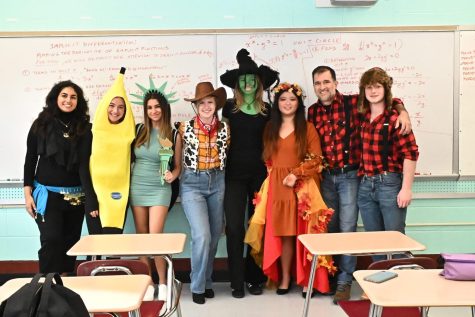The Power of Literature
Holden Caulfield once said of academia that phonies “were coming in through the *%$#@&$ window,” and he wasn’t incorrect. Today, the modern educational landscape is wracked by any and every variety of Common-Core-essential-question-SGO-baseline-marker-testing-achievement-AP-potential jargon, derived from school boards who aim for a spot in national rankings and covet top district awards.
Within this bureaucratic nightmare of a public education system, holistic, student-centered teaching has largely fallen by the wayside, and one of the most well-documented casualties of this approach has been English class, and the teaching of literature as a whole. There is no need to elaborate on this point; educators and journalists from a broad outlet of media sources, ranging from the Atlantic Monthly and The Washington Post to conservative think tank The Heritage Foundation have decried standards-based education, often documenting the vague language of the standards and how they affect teacher performance and student college readiness in terms of communication and critical thinking skills.
Yet within this hyper-fixation on standards based education and the supposed death of English class, the media often fails in chronicling the experiences of those most affected by this mediocre level of quality: the students themselves.
It cannot be overstated how the emphasis placed on such ideas as “critical thinking” and “practical application of skills” has warped the perspective of high school students in terms of their thinking about literature, and reading as a whole. Students feel pressure to become proficient in “practical” skills that lead to success in college and a career beyond it, with “practical” careers being those involving STEM subjects that will lead to jobs in the burgeoning fields of medicine, computer science, and engineering.
Those students that are shockingly not interested in any of the above listed occupations may develop feelings of shame or incompetence toward their own skill set, especially if it falls under the umbrella of such useless disciplines as history, art, music, and most prominently, creative writing and literary studies. When asked for their opinions on English class and reading, a few answers are recycled and repackaged into various forms of wording, coming in such flavors as the apathetic, “I don’t like reading,” “Reading is a chore,”; the overwhelmed, “I don’t have time to read,” “I dislike how we’re taught,”; and most heartbreaking, the self deprecating, “I can’t write,” “I’m not creative.” Thus, we have created a society in which one of the most fundamental forms of human expression, storytelling, has fallen into the bin of ridicule for educators and students alike.
However, it is not that students dislike English class, or analyzing written works for plot, character, theme, motif, and symbolism. Rather, students that can perform these skills do so with reluctance and their heads held low. In turning English class into a set of standards with objectives, baselines, and target levels of understanding, reading has become nothing more than a rote skill to be checked off of a list of benchmarks for college readiness, and this has devalued close reading and an appreciation of stories to a demographic that may need them more than any group at all.
To be clear, there is a level of skill-based achievement that should be present in any course, including English, and there is nothing misguided in creating a set of guidelines to steer student growth. This, however, is all they should be–guidelines, a frame of reference for creating curriculum, not a concrete map of exactly what skills should be taught and at what level they should approximate. In treating a h
olistic, individual, and malleable subject like English as something that can be put into clear cut compartments, the very ethos of the subject itself becomes a shallow, trivial shadow of what is otherwise an art so brimming with wisdom, beauty, and philosophy that it is head spinning to take it in to its full extent.
Even without these abstract concepts, reading and literature teach practical skills not easily found in other disciplines. Well-written literature should contain certain levels of structural and syntactic complexity that they lend themselves to close analysis of language, and model for students how to write with power and precision. The general media is not incorrect in bemoaning how students enter college unable to communicate using the written word, and this glaring issue could be remedied with lessons in close reading and writing that today are often limited to the realms of AP Lit and Lang classrooms. Written works of high quality can also aid in the development of the love-interest of standards based education, “critical thinking,” as it is unfathomable that students exposed to sufficient literary works, both fiction and nonfiction, come out unable to reason through problems or think outside the box. The types of critical thinking that literature develops, however, are not ones of solving math problems or writing computer code. It is a different sort of thinking, a psychological, introspective angle that is vital, yet lacking in modern education.
The general media has thoroughly documented the supposed crisis facing youth today, as the effects of a society more connected, yet more lonely, than ever before have begun to manifest with the power of the internet and social media. In a world infatuated with technology and progress, alarm bells are beginning to sound on the rising rates of teenage anxiety, depression, and self harm. This crisis is attributed to pressure from parents on students to achieve, the college admissions mania, the emerging culture of “Ivy or bust” and how it has driven students to the internet to supposedly rot in the gutters of Twitter and Instagram. This crisis is real, and both students and educators will be the first to confirm the deterioration of young people caught in a web of demanding classes, extracurriculars, and most devastating of all, no sleep.
And yet, we have the tools at our fingertips to help address this crisis, and they reside in the English classroom and the books within it.
Reading and English class is not a cure for a society drained of its feelings or mental stability, but it is a step from which to gain some clarity and emotional faculties back. Books offer something unlike any other form of media: unfettered access to another world, a world not portrayed by actors with the distance of the stage or screen. Older generations anguish over the lack of morality in the younger generation, but in the English classroom, the breeding ground for moral sense to develop, students are served a lukewarm platter of tepid “values” and a meager awareness of other ethnic or cultural groups, depending on the books read. Opening a book opens the door to another mind, another perspective, whether it’s Holden Caulfield on a quest to preserve what innocence is left in the world from phony, insensitive adults, Gregor Samsa grappling with his own fragile sense of self and turning into a “monstrous vermin” because of it, Offred providing a window into a world that, with the right switches flipped, could easily resemble our own path toward the robbing of women of their humanity, or the Buendía family serving as a microcosm for all that is tragic and comedic and brutally, unbearably alone about the human condition. English class should foster an awareness for this sort of thinking, looking at the world from the perspective of an author who attempts to communicate his or her own understanding of the world to the reader, and evoke a connection with them. Students do not achieve this, though, instead opting to dismiss themselves as lacking the skills to decipher the intentions of the author or too disconnected from their “imagination” to read. Yet there is nothing truly imaginative about literature that students cannot grasp, because all stories, whether rooted in reality, fantasy, or somewhere in between, speak to the fundamental truths of the human experience and human emotions.
We all have emotions. We all feel things. We all know the sting of confusion, sadness and neurosis. Literature is not the cure for these feelings, but it is an avenue of better understanding and coping with these fearsome beasts that tear apart teenagers today. Literature is one of the oldest forms of escape we have, and to devalue it, cause students to feel that it is impractical and unimportant, criminally steals away from a demographic who needs it the most as a way to grapple with feelings that are otherwise overwhelming to the point of breakage. We live in an era that promotes suppressing anything smacking of negativity or pain, but this is problematic: it is important that we confront our emotions and come to terms with what it implies about us and our own, personal struggles. We can give students the tools to live and deal with their emotions, and this is fostered through reading and understanding what others have to say about us, from Sophocles and Shakespeare to Fitzgerald and García Márquez.
Empathy is not a skill to be measured on an SGO; emotions are not standards that can be outlined in a curriculum in which students are evaluated for proficiency. Students may possess varying levels of competence in reading and writing, but no student is devoid of imagination and creativity.

Not every student will develop a lifelong desire to read, but they can all become aware of what literature has to offer – which is something apart from simply a path to a good college and a steady job. As Gabriel García Márquez wrote, “races condemned to one hundred years of solitude did not have a second opportunity on earth.” Our solitude is an emotional solitude, a solitude of feeling and understanding. We will not have a second chance if our books should waste away in the trenches of standards and skills and curriculum, but all is not lost yet. We must rediscover what made our species fall in love with reading once more, and dispense that love to our students to better understand themselves, and perhaps even understand each other.















